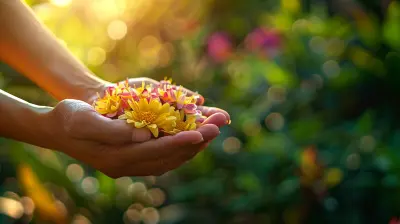8 March 2025
Relationships, huh? They can bring out the best in us, but sometimes, they can also bring out our inner baggage handler—piling on stress, anxiety, and even doubt. Have you ever felt like you’re walking on eggshells around someone, constantly feeling drained, or questioning your own worth? Chances are, you’re dealing with a toxic relationship. But don’t sweat it—you’re not alone, and you can absolutely take back control of your peace and happiness. How? By setting healthy boundaries.
This guide is here to help you recognize the signs of a toxic relationship and teach you how to navigate your way out (or back to balance) through the magic of boundaries. Let’s dive in! 
What Exactly Is a Toxic Relationship?
First things first: what does "toxic" even mean when it comes to relationships? Picture a plant—if the soil or environment is full of harmful chemicals, that plant can’t grow, right? The same goes for relationships. A toxic relationship is one where negativity, manipulation, or a lack of respect stunts your emotional growth and well-being.The toxicity can show up in any kind of relationship—romantic, familial, friendships, or even your work life. And here’s the kicker: it’s not always obvious. Toxicity can sometimes creep in subtly, like a slow leak that you don’t notice until your emotional tank is empty. 
Red Flags: How to Spot a Toxic Relationship
Let’s be real—you can’t fix what you can’t identify. So, here are some telltale signs that you may be in a toxic relationship:1. Constant Negativity
Ever feel like every interaction is like a grey cloud hanging over your head? Toxic people often focus on what’s wrong, criticize you, or drag you into their emotional storms.2. Control Issues
Are they overly controlling? Whether it’s your time, choices, or emotions, if someone constantly tries to dictate your life, red flags should be waving.3. Emotional Manipulation
Guilt trips, silent treatments, or gaslighting? Big yikes. Toxic people often manipulate situations to make you feel like the villain in their narrative.4. Lack of Respect for Boundaries
Do they ignore your "no"? Whether it’s interrupting your personal time or overstepping your comfort zone, a lack of boundaries is a huge red flag.5. Emotional Drainage
After spending time with them, do you feel exhausted, anxious, or on edge? A healthy relationship should feel like a two-way street, not an emotional black hole.Raise your hand (or maybe just nod) if this sounds familiar. Okay, so what now? 
Why Boundaries Are Your Secret Weapon
Let’s talk boundaries. If relationships are like plants, boundaries are the little fences that keep the weeds and pests out. They’re your way of saying, “This is where you stop, and I start.”What Are Healthy Boundaries?
Think of them as the ground rules you set to protect your mental, emotional, and physical well-being. They’re not walls to shut people out—they’re more like speed bumps that slow down toxic behaviors and give you space to breathe.Why Are They Important?
Without boundaries, you risk losing yourself in someone else’s chaos. Healthy boundaries help you:- Maintain your self-respect and self-worth.
- Communicate your needs clearly.
- Reduce stress and emotional burnout.
- Build stronger, balanced relationships.

How to Navigate Toxic Relationships with Healthy Boundaries
Alright, now let’s get practical. How do you actually implement boundaries in a toxic relationship? It’s easier said than done, I know. But with a little practice and a lot of self-love, you’ll be a boundary-setting ninja in no time.1. Identify the Problem Areas
Grab a journal (or even just your phone’s notes app) and reflect on what’s stealing your peace. Is it the endless negativity? The guilt trips? Pinpoint the behaviors or situations that make you feel uncomfortable or disrespected.2. Get Real with Yourself
Ask yourself: What do I want and need from this relationship? Sometimes we’re so focused on keeping others happy that we forget to check in with our own needs. It’s time to flip the switch.3. Communicate Clearly
This one’s key. Let the other person know where you stand—but keep it simple and assertive. For example:- Instead of: “You’re always bringing me down.”
- Say: “I feel overwhelmed when conversations are always negative. Let’s try focusing on some positive topics.”
Pro Tip: Use “I” statements to express how you feel, rather than blaming or accusing.
4. Learn to Say No Without Guilt
“No” is not a bad word, okay? It’s a complete sentence. Practice saying no without over-explaining or feeling guilty. For example:- “I can’t help you this time, but I’m sure you’ll figure it out.”
- “No, I’m not comfortable with that.”
5. Set Consequences and Stick to Them
Boundaries without consequences are like seatbelts that don’t lock up in an accident—useless. Let the other person know what will happen if they cross your boundary, and follow through if they do. For example:- “If you keep yelling at me, I’ll end the conversation.”
Sticking to your word may feel awkward at first, but trust me—it’s empowering.
6. Focus on Self-Care
Toxic relationships can drain your energy, so it’s vital to refill your emotional cup regularly. Whether it’s journaling, meditating, spending time with supportive people, or indulging in a hobby, prioritize YOU.When It’s Time to Walk Away
Sometimes, despite your best efforts, the other person refuses to respect your boundaries. And you know what? That’s their problem, not yours. You deserve peace, not constant emotional turmoil.If the toxicity continues, it may be time to reevaluate the relationship and consider walking away. Remember, choosing your mental health over a harmful relationship doesn’t make you selfish—it makes you brave.
FAQs About Toxic Relationships and Boundaries
1. Can toxic people change?
Yes, but only if they’re willing to acknowledge their behavior and put in the effort to change. However, change is their responsibility, not yours.2. How do I deal with guilt when setting boundaries?
Guilt is normal at first because you’re doing something unfamiliar. But remind yourself: boundaries protect your well-being—they’re not about punishing others.3. What if the toxic person is a family member?
Boundaries with family can be tricky, but they’re not impossible. Limit your interactions, keep conversations neutral, and don’t engage in drama.Final Thoughts
Navigating toxic relationships isn’t easy—it’s like trying to swim through quicksand. But here’s the good news: you have the power to set boundaries that protect your peace, rekindle your self-worth, and move forward with clarity. It’s not selfish; it’s essential.Remember, relationships are supposed to add to your life, not subtract from it. So, whether you choose to salvage the relationship or walk away, make your happiness and mental health a priority. Life’s too short to settle for anything less!









Amy Coleman
Set boundaries, reclaim your joy! 😊
April 7, 2025 at 4:57 AM